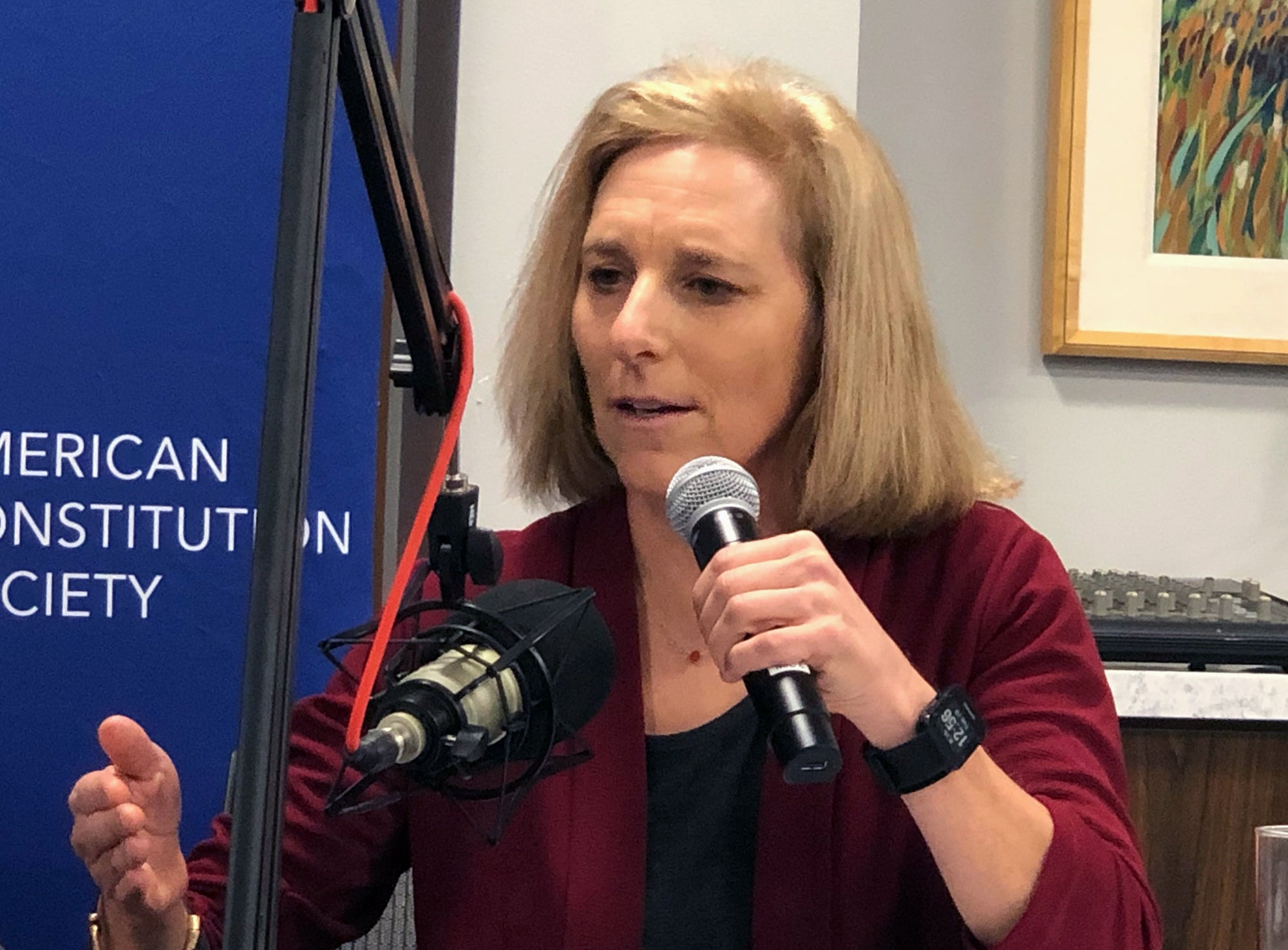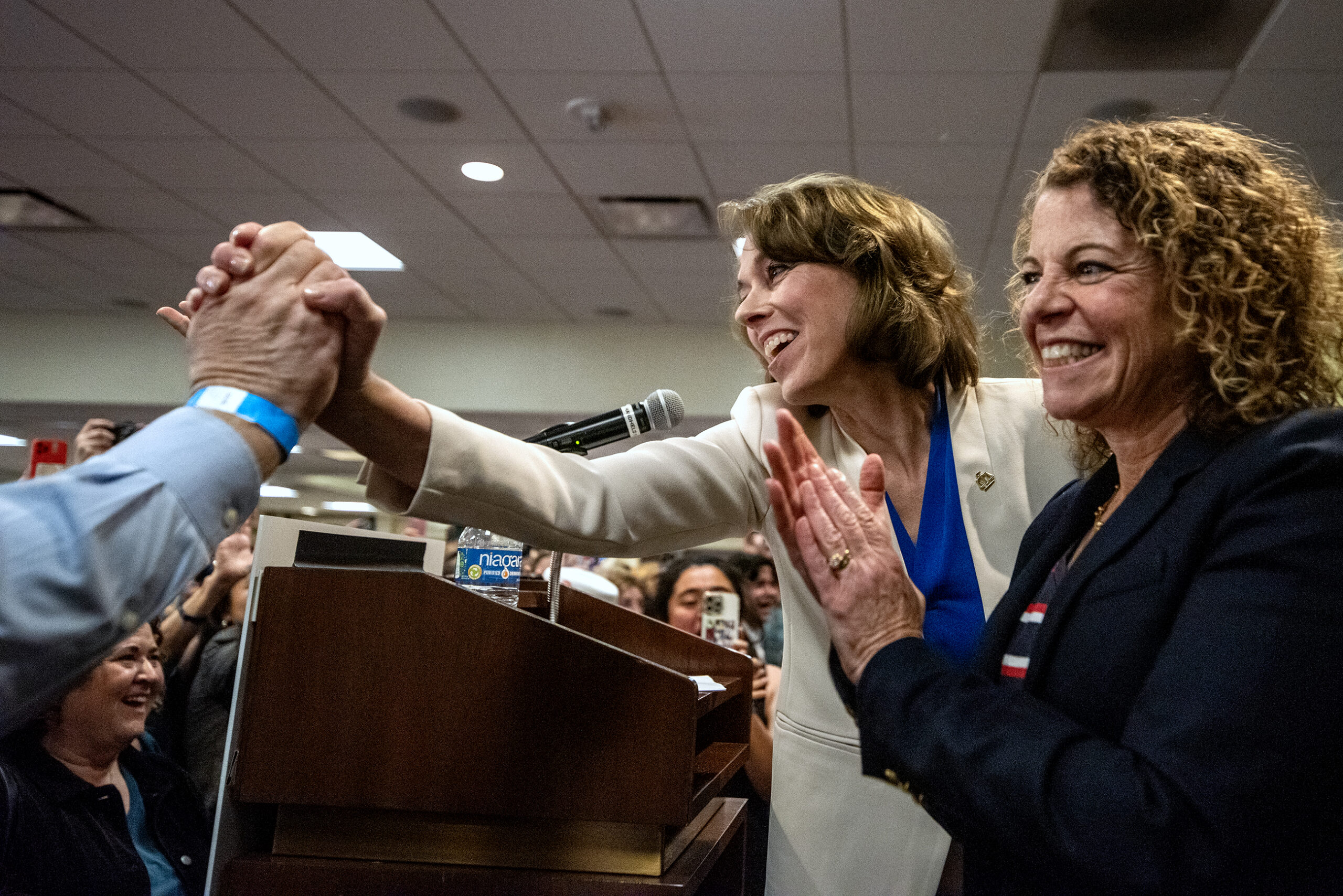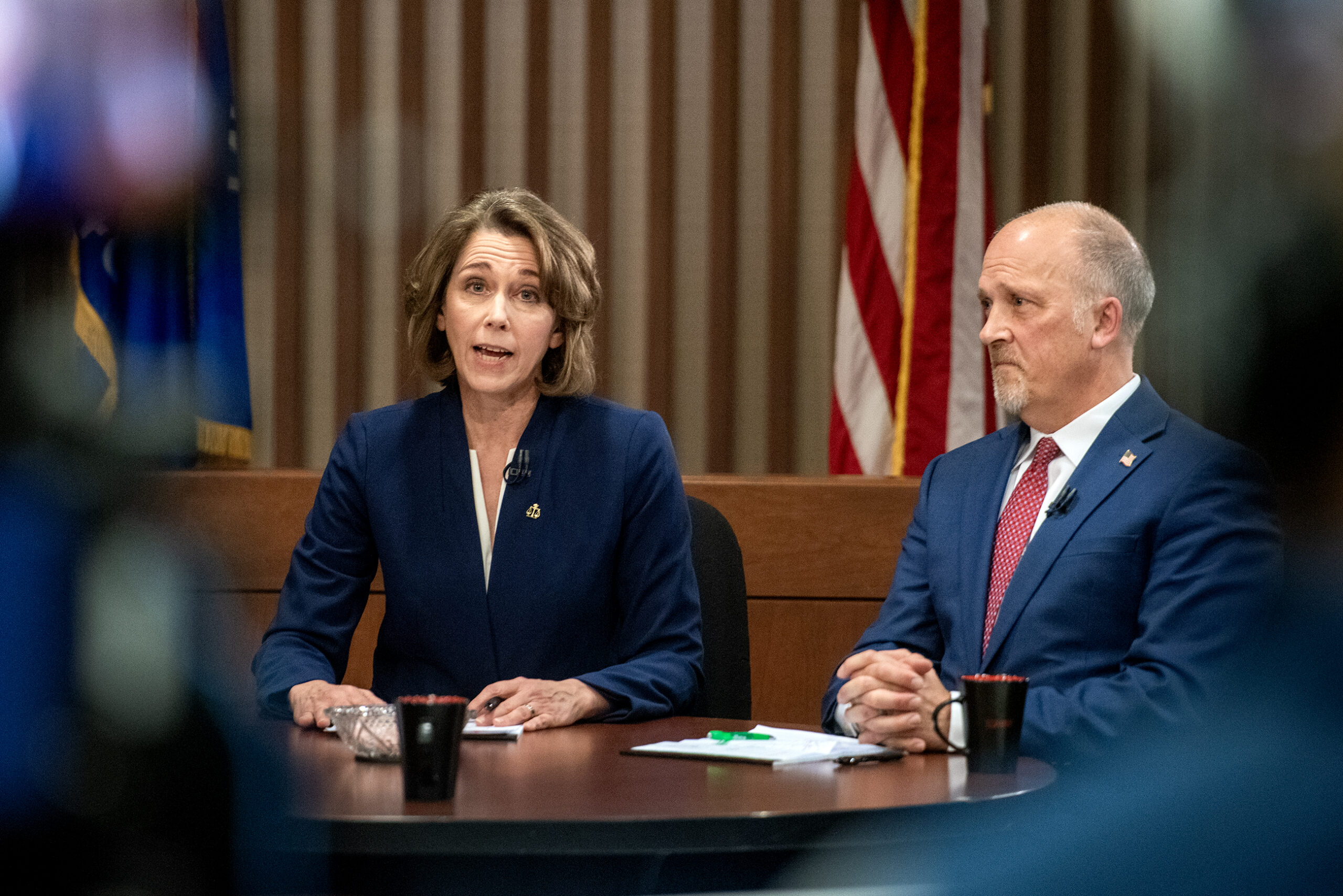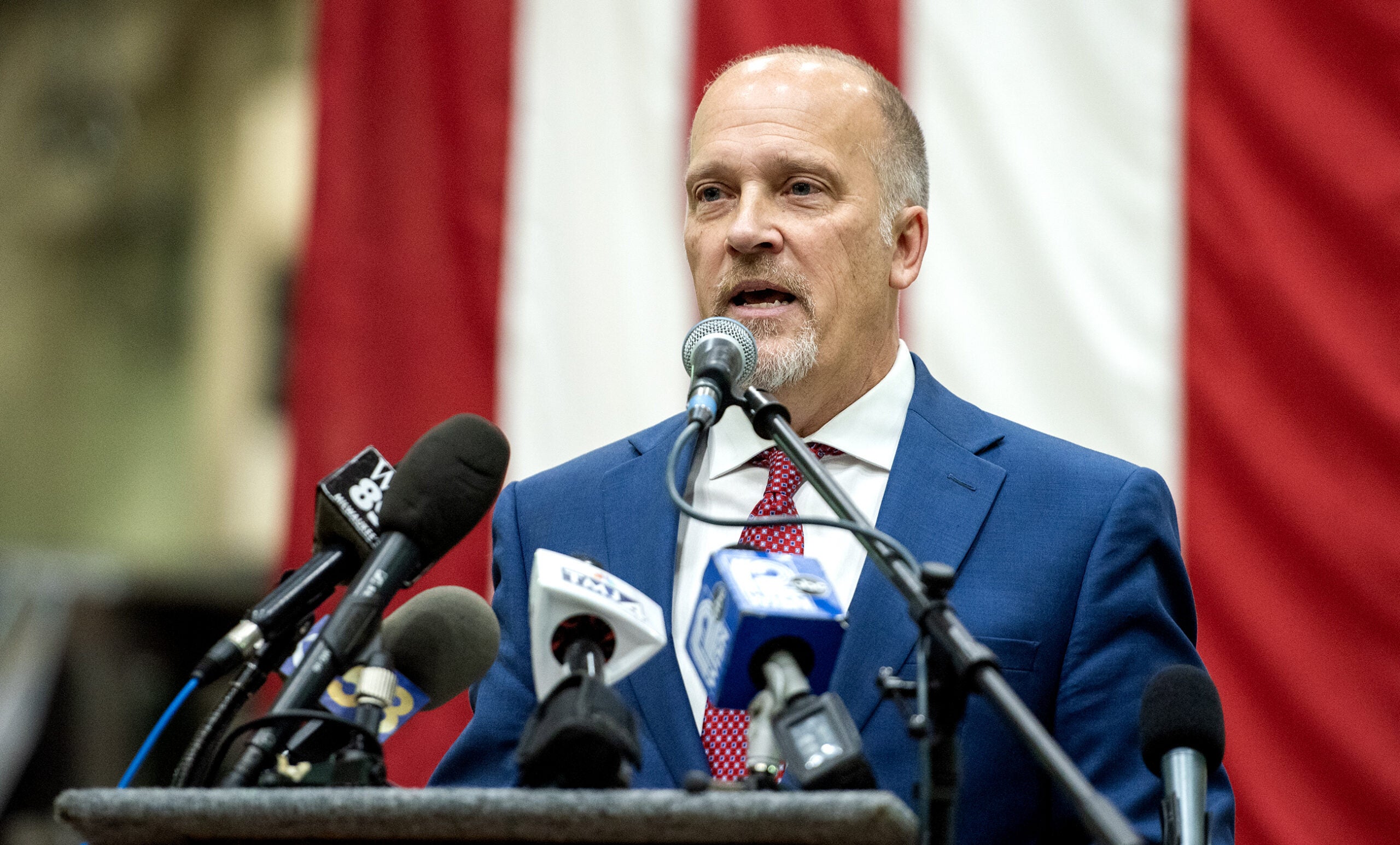Dane County Judge Jill Karofsky has won a 10-year term on the Wisconsin Supreme Court, defeating conservative incumbent Justice Daniel Kelly to hand Democrats a victory in the officially nonpartisan election.
According to preliminary results as of 10:40 p.m. Monday, Karofsky led Kelly 54-46 percent. While the results were released Monday, voting took place in-person last Tuesday and by mail over the course of the past month.
Karofsky’s campaign issued a statement declaring victory before the race was even officially called by the Associated Press.
Stay informed on the latest news
Sign up for WPR’s email newsletter.
“I want to send a heartfelt thank you to the hundreds of thousands of Wisconsinites who made their voice heard in this unprecedented election,” Karofsky said.”I’m honored to have earned the trust of people across this state who believe in a tough, fair, and independent judiciary and I promise to never forget these principles as their Wisconsin Supreme Court Justice.”
[[{“fid”:”912401″,”view_mode”:”embed_landscape”,”fields”:{“alt”:”Daniel Kelly”,”title”:”Daniel Kelly”,”class”:”media-element file-full”,”data-delta”:”1″,”format”:”embed_landscape”,”alignment”:”right”,”field_image_caption[und][0][value]”:”%3Cp%3EGov.%20Tony%20Evers%20gives%20his%20first%20State%20of%20the%20State%20address%20in%20Madison%2C%20Wisconsin%2C%20at%20the%20state%20Capitol%20building%20on%20Jan.%2022%2C%202019.%20Here%2C%20Wisconsin%20Supreme%20Court%20Justice%20Daniel%20Kelly%20is%20seen%20before%20the%20start%20of%20the%20speech.%20%3Cem%3EEmily%20Hamer%2FWisconsin%20Center%20for%20Investigative%20Journalism%3C%2Fem%3E%3C%2Fp%3E%0A”,”field_image_caption[und][0][format]”:”full_html”,”field_file_image_alt_text[und][0][value]”:”Daniel Kelly”,”field_file_image_title_text[und][0][value]”:”Daniel Kelly”},”type”:”media”,”field_deltas”:{“1”:{“alt”:”Daniel Kelly”,”title”:”Daniel Kelly”,”class”:”media-element file-full”,”data-delta”:”1″,”format”:”embed_landscape”,”alignment”:”right”,”field_image_caption[und][0][value]”:”%3Cp%3EGov.%20Tony%20Evers%20gives%20his%20first%20State%20of%20the%20State%20address%20in%20Madison%2C%20Wisconsin%2C%20at%20the%20state%20Capitol%20building%20on%20Jan.%2022%2C%202019.%20Here%2C%20Wisconsin%20Supreme%20Court%20Justice%20Daniel%20Kelly%20is%20seen%20before%20the%20start%20of%20the%20speech.%20%3Cem%3EEmily%20Hamer%2FWisconsin%20Center%20for%20Investigative%20Journalism%3C%2Fem%3E%3C%2Fp%3E%0A”,”field_image_caption[und][0][format]”:”full_html”,”field_file_image_alt_text[und][0][value]”:”Daniel Kelly”,”field_file_image_title_text[und][0][value]”:”Daniel Kelly”}},”link_text”:false,”attributes”:{“alt”:”Daniel Kelly”,”title”:”Daniel Kelly”,”class”:”media-element file-embed-landscape media-wysiwyg-align-right”,”data-delta”:”1″}}]]While any race for the court is important — Wisconsin has just seven justices who serve 10-year terms — the contest between Kelly and Karofsky took a distant back seat to the circumstances of the election itself. Despite daily warnings from the state and federal government to stay at home because of COVID-19, Wisconsin forged ahead with in-person voting.
To say that this was an unusual election would be an understatement.
On election day, voters and poll workers covered themselves with face masks, gloves, goggles and plastic aprons in an effort to guard themselves against the spread of the new coronavirus.
Prior to then, more than a million voters requested absentee ballots, shattering records for what might normally be a low-turnout election.
Amidst that surge in absentee voting, multiple lawsuits were filed to try to postpone or delay the election. U.S. District Court Judge William Conley ruled he lacked the power to delay the election, but Conley did give voters until 4 p.m. April 13 to return absentee ballots. In a separate order, Conley banned clerks from releasing any results until that time.
Under Conley’s original order, voters could have cast ballots up until April 13, but the U.S. Supreme Court ruled the ballots must be postmarked or delivered by April 7.
That decision has left many clerks unclear on how to treat ballots that were mailed in time that include no postmark, which mail carriers say is not required under the U.S. postal code. The ambiguity may lead to a situation where cities choose their own paths, as Milwaukee did Monday when its Election Commission voted to accept 390 Milwaukee County absentee ballots that had unclear or no postmark.
Even before vote totals were announced Monday, a group of Milwaukee-area residents filed a class-action lawsuit seeking a partial or full re-vote of the election. And Karofsky herself was soliciting donations to her legal fund.
While Supreme Court elections races are relatively obscure at the state level, national politicians have staked their claims on Wisconsin’s race. Democrats Joe Biden and Bernie Sanders both endorsed Karofsky. President Donald Trump has campaigned for Kelly, both on Twitter and at a White House coronavirus briefing.
Kelly was appointed to the state Supreme Court by former Republican Gov. Scott Walker in 2016. Prior to joining the court, he worked for years as a lawyer in private practice, including on a case that successfully defended the Republican redistricting plan Walker signed into law nearly a decade ago.
He issued a statement Monday night saying he was grateful to have served on the court.
“Obviously I had hoped my service would continue for another decade, but tonight’s results make clear that God has a different plan for my future,” Kelly said. “I congratulate Judge Karofsky and wish her well as she assumes the responsibilities of this important office.”
Kelly is the first incumbent justice to lose election to the court since Louis Butler, a Democratic appointee who lost his race to Michael Gableman in 2008. Prior to that, no incumbent had lost since 1967.
Karofsky won a race for Dane County judge in 2017. She’s backed by prominent Democrats, including former Gov. Jim Doyle, a family friend.
Even with Karofsky’s win, conservatives still hold a 4-3 majority on the Supreme Court, meaning they’ll control the court during the next round of redistricting unless a justice leaves before the end of their term.
But given their new numbers, liberals will have a chance to flip control of the court during the next scheduled election in 2023.
Wisconsin Public Radio, © Copyright 2025, Board of Regents of the University of Wisconsin System and Wisconsin Educational Communications Board.







